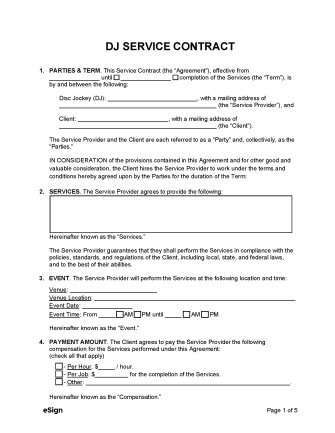

A disc jockey (DJ) contract is used when a client hires a DJ to provide music for an event . The document outlines all the necessary details of the DJ’s work, including the venue location, event date, event time, service fees, and overtime rates. Cancelation and refund policies may be included to protect the parties in the event of unforeseen circumstances. For instance, the parties can specify resolution procedures in advance to prepare for a power outage.
A disc jockey contract will include the name and address of the service provider (the DJ) and the client who hired them. If either party is a business, the contract should instead provide the company’s information (i.e., entity name and business address).
When hiring a DJ, it’s important that the agreement explains all the event information to avoid misunderstandings down the line. Some event details that should be written into the contract include:
A short explanation of the DJ’s responsibilities should be stated in the contract. Apart from playing music, the DJ may also be in charge of hosting duties (a.k.a., emceeing), lighting, and video playback.
Pricing terms will be included in the contract to define the DJ’s service fee and to specify any other pricing details , such as overtime rates or deposit amounts.
The contract should describe whether or not the service arrangement can be canceled before the event date. If the contract can be ended early, the form should state the procedures for cancelation, including any refund policies.
A disc jockey contract is created when a DJ and their client want to get the details of the working relationship on paper (as opposed to a handshake agreement). The agreement should be made in advance of the event date. The earlier the contract is signed, the better, as it gives the DJ enough time to source the equipment they need and create a suitable playlist for the occasion.
The following are a few events/gigs that generally require a DJ contract:
When a written contract is used to define the service relationship, there are several advantages for both the client and the DJ, including the following :